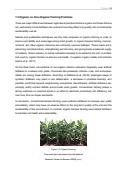Page |3 1.3 Organic vs. Non-Organic Farming Practices There are major differences between agricultural practices that are organic and those that are not, particularly in how fertilisers are used and how they affect crop quality and environmental sustainability overall. Natural and sustainable techniques are the main emphasis of organic farming in order to improve soil fertility and encourage strong plant growth. In organic banana farming, manure, compost, and other organic resources are commonly used as fertilisers. These inputs aid in enhancing microbial activity, strengthening soil structure, and giving plants a balanced supply of nutrients. Green manure, or plants cultivated expressly to be added to the soil, is another tool used by organic farmers to improve soil health. It supplies organic matter and nutrients (Harris et al., 2017). On the other hand, conventional or non-organic banana cultivation frequently uses artificial fertilisers to increase crop yields. Chemicals like potassium chloride, urea, and ammonium nitrate are among these fertilisers. According to Williams et al. (2016), prolonged usage of synthetic fertilisers may result in soil deterioration, a decrease in microbial diversity, and possible runoff that impacts neighbouring ecosystems. Nevertheless, artificial fertilisers can promptly rectify nutrient deficits and promote plant growth. Conventional farming places a strong emphasis on chemical inputs in an effort to maximise productivity and efficiency, but over time, this can impair soil health. In conclusion, conventional banana farming uses synthetic fertilisers to increase crop yields immediately, which may have an adverse effect on the long-term quality of the soil and the sustainability of the environment. In contrast, organic banana farming uses natural fertilisers to maintain soil health and sustainability. Figure 1.3: Organic Farming Crop production information from the National Research Centre for Banana (NRCB) (n.d.)
